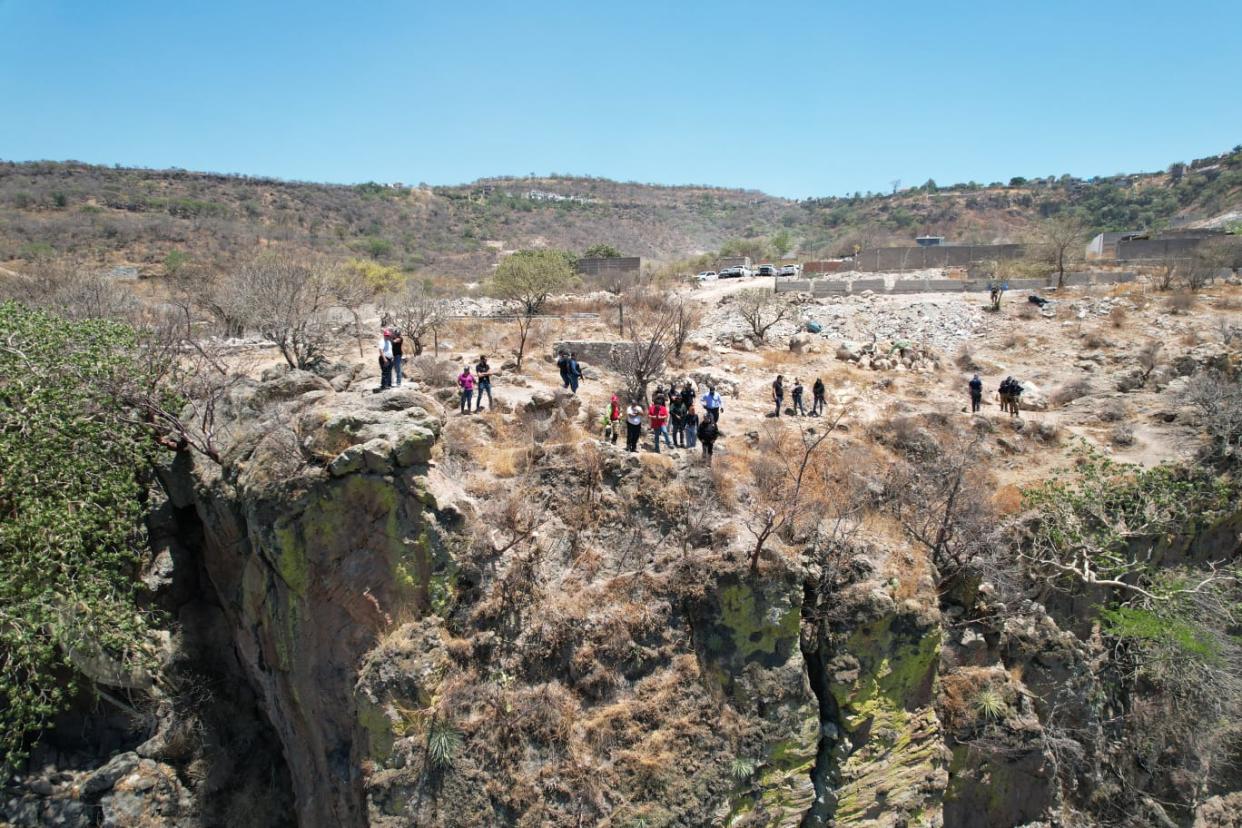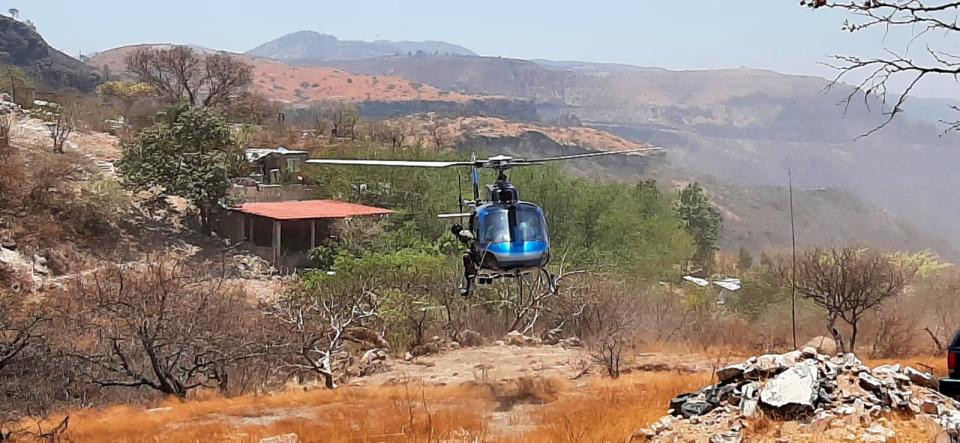Looking to sell or buy a Mexican timeshare? FBI says cartel may be calling

MEXICO CITY – That person on the phone — the one who says they have a buyer for the timeshare you’re looking to sell in Mexico ― might just be an associate of one of the most dangerous and ruthless criminal organizations in North America.
A recent bulletin from the FBI said its Internet Crime Complaint Center received more than 600 complaints about Mexican timeshare scammers in 2022 alone.
Victims, most often elderly, lost nearly $40 million.
And now the scam has taken a deadly turn, with the grisly discovery of multiple bags filled with human remains near Guadalajara in Jalisco state in June.
The Jalisco New Generation Cartel, known as CJNG, is believed to be the mastermind of the plan. CJNG is based in Puerto Vallarta, also in Jalisco.
“CJNG’s deep involvement in timeshare fraud in the Puerto Vallarta area and elsewhere, which often targets elder U.S. citizens and can defraud victims of their life savings, is an important revenue stream supporting the group’s overall criminal enterprise,” said Brian E. Nelson, undersecretary of the U.S. Treasury for Terrorism and Financial Intelligence.
The Treasury Department’s Office of Foreign Assets Control (OFAC) placed sanctions on CJNG members and associates in April.
Seven individuals and 19 Mexican tourism or real estate companies were targets of the sanctions, which freeze any assets they may have in the U.S. and bar U.S. citizens and companies from having any financial dealings with them.
OFAC also designated Eduardo Pardo Espino as a fugitive from justice and financial operator for CJNG. Pardo was charged in federal court in California in 2019 with conspiracy to distribute methamphetamine.
“Pardo has also played a role in Servicios Administrativos Fordtwoo, S.A. de C.V., which is linked to CJNG’s timeshare fraud activities and has made direct payments to CJNG members,” OFAC reported.
Servicios Administrativos Fordtwoo, S.A. de C.V. is one of the 19 Mexican companies sanctioned by the Treasury Department.
How the timeshare scam works
This type of ruse has been going on for years, according to U.S. authorities.
Timeshare owners receive unexpected calls or emails from criminals pretending to be sales representatives for a timeshare resale company.
A timeshare is a vacation property that is split among multiple owners. Each owner gets an allotted amount of time to use the property.
Owners seeking to sell their piece of the timeshare are drawing much of the cartel's attention, though cold calls to random numbers are also used.
“The sales representatives often use high-pressure sales tactics to add a sense of urgency to the deal,” a public service announcement from the FBI reads.
“Timeshare owners who agree to sell are told they must pay an upfront fee to cover anything from listing and advertising fees to closing costs. Once the fee is paid, timeshare owners report the company becomes evasive, calls go unanswered, numbers are disconnected, or the company creates additional fees that victims are required to pay before the real estate transaction becomes final.”
Some scammers try to take advantage of the same person twice, when the victims are contacted by a fraudulent timeshare recovery company that promises assistance in recuperating money lost in the first scam.
The faux recovery companies charge an upfront fee for their services, which are never carried out.
More: US tourists beware: Popular Mexico getaway plagued by drug cartel intimidation and violence
45 plastic bags
Eight workers from a call center near Guadalajara went missing in late May.
A U.S. official confirmed to the Associated Press that authorities suspect the workers made calls on behalf of the cartel but decided to quit their jobs.
The Jalisco prosecutor’s office recovered documents with a list of names of foreigners, drugs, a bill counting machine, red stains believed to be blood, as well as "timeshare memberships and economic goals to be achieved," a statement from Mexican authorities reads.
In early June, at least 45 plastic bags filled with pieces of human remains were found in a ravine near Guadalajara, Mexico’s government said. The remains were tied to the missing call center workers by forensic specialists.

“The cartel hired ordinary workers to make the calls and fulfill the bank transactions,” Mexico-based security analyst David Saucedo said.
“I know that some workers didn't know anything, that they genuinely came looking for a job. They had the need for an income. Regardless of whether they were aware or not, the facts are certainly shocking that the cartel made the decision to kill them all.”
‘Diversification of criminal activities’
CJNG is known mainly for its drug trafficking operations, which have helped flood the U.S. with fentanyl and other drugs, but it also has been linked with kidnapping, extortion and money laundering.
Timeshare fraud is a new addition to its criminal portfolio.
Along with the Sinaloa Cartel, CJNG is among the two most dominant cartels in Mexico, according to the U.S. Drug Enforcement Administration.
“I think that this is really about the diversification of criminal activities,” said Nathan Jones, nonresident scholar in drug policy and Mexico studies at the Baker Institute. “These cartels and organized crime in Mexico are just getting into so many more sidelines that are delving into the legal world.”
He said the many different illicit pursuits are making Mexican organized crime “look a lot more like classic mafia activities that we oftentimes saw in the United States.”
According to Insight Crime, “The CJNG’s involvement in the timeshare scheme is only the tip of the iceberg concerning their involvement in businesses across the tourism sector in Puerto Vallarta…
“Hotels, bars, restaurants, and now timeshares, are particularly attractive since they provide access to a range of other criminal activities, including money laundering, human trafficking, and drug trafficking,” a Mexican government official told the think tank and media organization.
Targeting Americans
“I think Americans are more likely to be targeted by the perception that they're more likely to be wealthy and then, you know, an easier mark essentially for organized crime,” Jones said.
However, Jones reminded that scams can happen anywhere, and that “people just have to be careful, particularly about putting money up front. That's kind of a red flag.”
Saucedo said the timeshare scam is different from other cartel activities because of the direct way it’s carried out.
“It is no longer about the sale of drugs on the streets of Los Angeles that some young Americans could eventually consume,” he said. “These are drug cartels that are interacting with U.S. citizens and eventually kidnapping or defrauding them.
“We know that the U.S. authorities are monitoring these activities because they are targeting Americans directly.”
If you or someone you know has fallen victim to the scam, the FBI advises filing a complaint with its Internet Crime Complaint Center at www.ic3.gov.
Background: CJNG, a top U.S. target, blamed in assassination attempt on Mexico City police chief
Karol Suárez is a Venezuela-born journalist based out of Mexico City. She is a contributing writer to The Courier Journal. Follow her on Twitter at @KarolSuarez_.
This article originally appeared on Louisville Courier Journal: FBI says Americans lose millions in Mexican drug cartel timeshare scam

